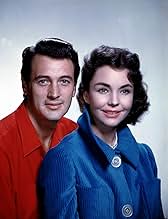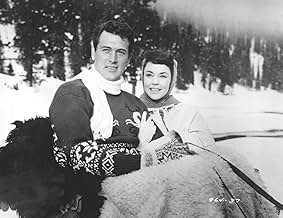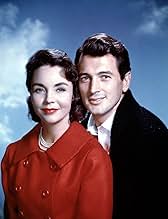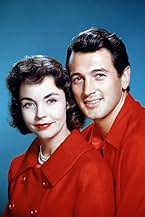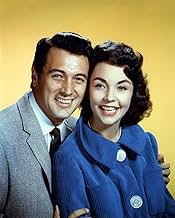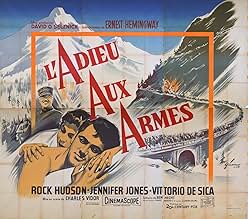IMDb RATING
5.8/10
3.1K
YOUR RATING
An English nurse and an American ambulance driver on the Italian front during World War 1 fall in love, but the horrors surrounding them challenge their romance to the limit.An English nurse and an American ambulance driver on the Italian front during World War 1 fall in love, but the horrors surrounding them challenge their romance to the limit.An English nurse and an American ambulance driver on the Italian front during World War 1 fall in love, but the horrors surrounding them challenge their romance to the limit.
- Directors
- Writers
- Stars
- Nominated for 1 Oscar
- 1 win & 2 nominations total
José Nieto
- Major Stampi
- (as Jose Nieto)
Georges Bréhat
- Captain Bassi
- (as Georges Brehat)
Luigi Barzini
- Court Martial Colonel
- (uncredited)
Memmo Carotenuto
- Nino the Doorkeeper
- (uncredited)
- Directors
- Writers
- All cast & crew
- Production, box office & more at IMDbPro
Featured reviews
Strange that one of America's favorite writers has no success in having his novels transferred to the screen with any fidelity or improvement over the original. 'A Farewell to Arms' is a lumbering, turgid, over-stuffed movie that never seems real. Chemistry between Hudson and Jones is simply not there--Jennifer Jones, in particular, seems remote and detached as the nurse even when she's supposed to be wildly in love. And then there's the matter of length--it seems to go on forever with a very weak resolution.
David O. Selznick wanted to create something that would rank alongside his 'Gone with the Wind' as an epic romance with a war background--but the talky script defeated everyone. Hemingway himself publicly disowned the movie, claiming that Jones was far too old for the part and unhappy about the film in general. At any rate, it was not the hoped for success and did nothing to halt the decline of Selznick's career--or Jennifer Jones' career for that matter. A big disappointment.
David O. Selznick wanted to create something that would rank alongside his 'Gone with the Wind' as an epic romance with a war background--but the talky script defeated everyone. Hemingway himself publicly disowned the movie, claiming that Jones was far too old for the part and unhappy about the film in general. At any rate, it was not the hoped for success and did nothing to halt the decline of Selznick's career--or Jennifer Jones' career for that matter. A big disappointment.
I really wanted to like A Farewell to Arms. But despite for love for Ernest Hemingway and for Rock Hudson, A Farewell to Arms just didn't work for me. Granted it does look amazing, with ravishing use of CinemaScope and the scenery and costumes are gorgeous as you can see in the first hour. The direction is fine, and the music is beautiful and cleverly composed. However, in the pace the film was very pedestrian, but the pace wasn't the only dull thing about it. I am especially talking about the story, which was overall uninteresting and wasn't affecting, and the script, which is really stilted in a lot of scenes. The ending also felt abrupt. The acting is not good, considering how talented the actors are. I love Rock Hudson, and he visibly tries hard and looks really handsome here but he seems very out of his depth. Jennifer Jones is miscast, and her performance is a very uneven mix of overacting and underacting, also she seems very detached from her character and Hudson as well. As for Vittoria di Sica, he overdoes it so wildly you feel as though he accidentally walked onto the wrong set. All in all, despite the talented cast and director and the beautiful visuals and score, the film was dull. 3/10 Bethany Cox
Rock Hudson wasn't bad but it was painfully obvious that Jennifer Jones was a lot older than him. It was absurd she was supposed to be English when she sounded just as American as Hudson and Elaine Stritch. The film is spectacular but too overblown for a trifling romantic story.
A lot of people are being terribly unfair to this production of A Farewell To Arms. Not that it's a great film, it misses that by a good distance, but that even films that are the best adaptations of Ernest Hemingway's work fall far short for Hemingway purists. And David O. Selznick was far from a Hemingway purist.
No Selznick when it came to the career of his wife Jennifer Jones lost all kinds of sense of balance. Another reviewer was quite right, Jean Simmons, Joan Collins, Elizabeth Taylor all would have made acceptable Catherine Barkleys.
One thing also to remember that we're not even starting out with pure Hemingway to begin with. Both this version and the 1932 version that starred Gary Cooper and Helen Hayes are not just based on the novel, they are based on a play that was adapted from the novel by Laurence Stallings who wrote What Price Glory. The play ran for 30 performances in 1930 and starred Glenn Anders and Elissa Landi on Broadway. I suspect the Depression had a lot to do with the closing as it did many shows that year.
Originally John Huston was slated to direct and he had directed Jones in both We Were Strangers and Beat The Devil with little or no interference from Selznick. But Selznick fired Huston and replaced him with Charles Vidor because allegedly too much attention was paid to Rock Hudson and not enough to Jennifer.
That's ironic as all get out because the novel itself is as all Hemingway works is male chauvinistic in the extreme. If he wanted to showcase Jennifer, any Hemingway just ain't the vehicle. He should have used one of the Bronte sisters.
Since the novel is male oriented Rock Hudson makes a fine Fredric Henry, the idealistic man who volunteers on the Italian front as an ambulance driver to experience war so he can write about it when it's over. On that Italian front it didn't look like it was ever going to be over.
That's another problem with this work, how do you sell it to the movie going public, as a romance or an anti-war tract? If you're Adolph Zukor for Paramount or David O. Selznick probably romance is the aspect that does sell.
The third major character in the film is that of the Italian army doctor Major Rinaldi played here by Vittorio DeSica. This version is more faithful to the book and presents Rinaldi as a three dimensional character.
In the 1932 version Adolphe Menjou was Rinaldi and Menjou did fine with the part as your typical suave continental type. Here Rinaldi's outspokenness about the futility of the Italian campaign leads to tragedy. It also led to an Oscar nomination for Vittorio DeSica as Best Supporting Actor. It was the only recognition A Farewell To Arms got from the Academy and DeSica lost to Red Buttons for Sayonara.
Whether Huston or Vidor did them, the battle scenes and the scenes of retreat are shattering and moving. Given the unique problems of Hemingway and Selznick, we're lucky the film came out as good as it did.
No Selznick when it came to the career of his wife Jennifer Jones lost all kinds of sense of balance. Another reviewer was quite right, Jean Simmons, Joan Collins, Elizabeth Taylor all would have made acceptable Catherine Barkleys.
One thing also to remember that we're not even starting out with pure Hemingway to begin with. Both this version and the 1932 version that starred Gary Cooper and Helen Hayes are not just based on the novel, they are based on a play that was adapted from the novel by Laurence Stallings who wrote What Price Glory. The play ran for 30 performances in 1930 and starred Glenn Anders and Elissa Landi on Broadway. I suspect the Depression had a lot to do with the closing as it did many shows that year.
Originally John Huston was slated to direct and he had directed Jones in both We Were Strangers and Beat The Devil with little or no interference from Selznick. But Selznick fired Huston and replaced him with Charles Vidor because allegedly too much attention was paid to Rock Hudson and not enough to Jennifer.
That's ironic as all get out because the novel itself is as all Hemingway works is male chauvinistic in the extreme. If he wanted to showcase Jennifer, any Hemingway just ain't the vehicle. He should have used one of the Bronte sisters.
Since the novel is male oriented Rock Hudson makes a fine Fredric Henry, the idealistic man who volunteers on the Italian front as an ambulance driver to experience war so he can write about it when it's over. On that Italian front it didn't look like it was ever going to be over.
That's another problem with this work, how do you sell it to the movie going public, as a romance or an anti-war tract? If you're Adolph Zukor for Paramount or David O. Selznick probably romance is the aspect that does sell.
The third major character in the film is that of the Italian army doctor Major Rinaldi played here by Vittorio DeSica. This version is more faithful to the book and presents Rinaldi as a three dimensional character.
In the 1932 version Adolphe Menjou was Rinaldi and Menjou did fine with the part as your typical suave continental type. Here Rinaldi's outspokenness about the futility of the Italian campaign leads to tragedy. It also led to an Oscar nomination for Vittorio DeSica as Best Supporting Actor. It was the only recognition A Farewell To Arms got from the Academy and DeSica lost to Red Buttons for Sayonara.
Whether Huston or Vidor did them, the battle scenes and the scenes of retreat are shattering and moving. Given the unique problems of Hemingway and Selznick, we're lucky the film came out as good as it did.
The Gary Cooper/Helen Hayes version of A Farewell To Arms, well acted for the time it was made, seems dated now. The 1957 version of Hemingway's great romantic novel is, like The Sun Also Rises, another adaptation of one of Papa's masterpieces, pretty to look at, expensively made, and wooden in all other respects.
In this version Hudson is earnest but bland, Jones too old, De Sica in the wrong movie and Stritch, well, her acid nurse is one of the film's only bright spots.
But the real reason to see the film is the ravishing musical score by Mario Nasciembe. Talk about romantic! Talk about lush! Talk about unforgettable! Had the film been as good as it's musical score it would have been a classic; what A Farewell To Arms ultimately is though, is an overstuffed period piece and a tepid finale to the great David Selznick's career. (By the way should you want to skip the film, the soundtrack is currently available on CD.)
In this version Hudson is earnest but bland, Jones too old, De Sica in the wrong movie and Stritch, well, her acid nurse is one of the film's only bright spots.
But the real reason to see the film is the ravishing musical score by Mario Nasciembe. Talk about romantic! Talk about lush! Talk about unforgettable! Had the film been as good as it's musical score it would have been a classic; what A Farewell To Arms ultimately is though, is an overstuffed period piece and a tepid finale to the great David Selznick's career. (By the way should you want to skip the film, the soundtrack is currently available on CD.)
Did you know
- TriviaRock Hudson turned down The Bridge on the River Kwai (1957), Sayonara (1957) and Ben-Hur (1959) in order to make this film. He later said this was the biggest mistake of his career.
- GoofsThe British nurses at the hospital all have American accents.
- Quotes
Major Alessandro Rinaldi: She's very strange, very moody, who knows she might even prefer you to me.
- Crazy creditsProducer David O. Selznick tries to imitate the opening credits of his classic film, "Gone With The Wind", by having the letters of the title "A Farewell to Arms" sweep slowly across the screen from right to left.
- ConnectionsFeatured in Au coeur du temps: The Ghost of Nero (1967)
- How long is A Farewell to Arms?Powered by Alexa
Details
- Release date
- Country of origin
- Languages
- Also known as
- Adiós a las armas
- Filming locations
- Venzone, Udine, Friuli-Venezia Giulia, Italy(first 20 minutes)
- Production company
- See more company credits at IMDbPro
Box office
- Budget
- $4,353,000 (estimated)
- Gross worldwide
- $18,989
- Runtime2 hours 32 minutes
- Color
- Aspect ratio
- 2.35 : 1
Contribute to this page
Suggest an edit or add missing content



